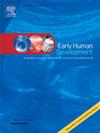极早产儿和/或极低出生体重儿独立行走前支气管肺发育不良的严重程度和神经运动发育特征:日本儿童医疗中心的一项回顾性队列研究
IF 2
3区 医学
Q2 OBSTETRICS & GYNECOLOGY
引用次数: 0
摘要
目的:本研究旨在确定支气管肺发育不良(BPD)及其严重程度对足月前神经系统检查和极早产儿和/或极低出生体重(VLBW)婴儿独立行走前大运动技能发展的影响。方法:本研究为回顾性队列研究。参与者是2017年至2021年期间在日本儿童医院新生儿重症监护病房住院的非常早产和/或VLBW婴儿。回顾性地从医疗记录中提取临床、人口统计学和结局变量。主要结果测量是Hammersmith新生儿神经系统检查(HNNE)评分,相当于足月时的神经系统检查,以及获得每种大运动技能的年龄。结果:共纳入123例婴儿,其中无BPD 62例,轻度BPD 23例,中度BPD 25例,重度BPD 13例。在神经系统检查结果中,无论是HNNE总分还是分类评分,组间均无显著差异。对于大肌肉运动技能,调整混杂因素后的分层多元回归分析结果显示,即使在改变模型后,严重的BPD仍然是延迟获得大多数大肌肉运动里程碑的因素。所有模型的未标准化系数(beta)恢复到指数范围为1.16 ~ 1.32。结论:参与极早产儿和/或重度BPD婴儿随访的临床医生应从产后早期开始监测和支持重度BPD婴儿的发育。本文章由计算机程序翻译,如有差异,请以英文原文为准。
Severity of bronchopulmonary dysplasia and characteristics of neuro-motor development prior to acquisition of independent walking in very preterm and/or very low-birth-weight infants: A retrospective cohort study in a children's medical centre in Japan
Objective: This study aimed to determine the effect of bronchopulmonary dysplasia (BPD) and its severity on neurological examination at equivalent to full term and the development of gross motor skills prior to the acquisition of independent walking in very preterm and/or very low-birth-weight (VLBW) infants.
Methods: This study was a retrospective cohort study. Participants were very preterm and/or VLBW infants who were admitted to a neonatal intensive care unit at a children's hospital in Japan between 2017 and 2021. Clinical, demographic, and outcome variables were retrospectively extracted from medical records. The main outcome measures were the Hammersmith Neonatal Neurological Examination (HNNE) score, a neurological examination at the equivalent of full term, and the age at acquisition of each gross motor skill.
Results: In total, 123 infants were included, of whom 62 did not have BPD, 23 had mild BPD, 25 had moderate BPD, and 13 had severe BPD. No significant differences were observed between groups in the neurological examination results for either the total or categorical HNNE scores. For gross motor skills, the results of hierarchical multiple regression analyses adjusted for confounding factors showed that severe BPD remained a factor that delayed the acquisition of most gross motor milestones, even after changing the models. The unstandardised coefficients (beta) restored to the exponent ranged from 1.16 to 1.32 for all models.
Conclusions: Clinicians involved in the follow-up of very preterm and/or VLBW infants should monitor and support the development of infants with severe BPD from the early postnatal period.
求助全文
通过发布文献求助,成功后即可免费获取论文全文。
去求助
来源期刊

Early human development
医学-妇产科学
CiteScore
4.40
自引率
4.00%
发文量
100
审稿时长
46 days
期刊介绍:
Established as an authoritative, highly cited voice on early human development, Early Human Development provides a unique opportunity for researchers and clinicians to bridge the communication gap between disciplines. Creating a forum for the productive exchange of ideas concerning early human growth and development, the journal publishes original research and clinical papers with particular emphasis on the continuum between fetal life and the perinatal period; aspects of postnatal growth influenced by early events; and the safeguarding of the quality of human survival.
The first comprehensive and interdisciplinary journal in this area of growing importance, Early Human Development offers pertinent contributions to the following subject areas:
Fetology; perinatology; pediatrics; growth and development; obstetrics; reproduction and fertility; epidemiology; behavioural sciences; nutrition and metabolism; teratology; neurology; brain biology; developmental psychology and screening.
 求助内容:
求助内容: 应助结果提醒方式:
应助结果提醒方式:


